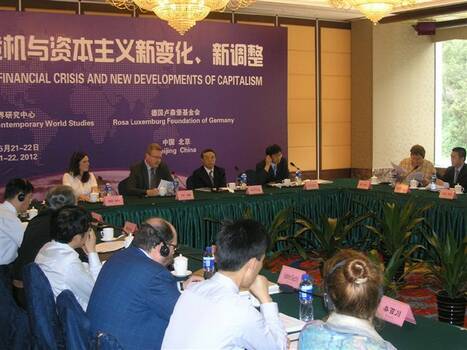
It was co-organized by the China Centre for Contemporary World Studies (CCCWS) and the Rosa Luxemburg Stiftung (RLS). More than 20 economists, policy advisers, researchers and politicians from China, Britain, Germany, Greece and Italy exchanged views on the impact of the international financial crisis in Europe and China, new developments of capitalism, and reforms of the international economic and financial governance system in the aftermath of financial crisis. The symposium was held on the occasion of the 10th anniversary of the cooperation between the CCCWS and the RLS. Lutz Pohle, chief representative of RLS Beijing Office, said in his opening remarks that “Over the past decade our cooperation with the CCCWS has brought together nearly 1000 high level specialists and experts from all over the world to exchange and discuss their opinions on topics of national and international concern which sometimes reached the edges of understanding between the East and the West. I am convinced that the symposium this year will be a new milestone for our exchange and cooperation between our two institutions”.
In the run of the symposium the participants reached consensus on the following points: 1) Financial crisis resulted in a severe and far-reaching impact both on Europe and China, but also provided a hard-won opportunity to strengthen pragmatic cooperation and to deepen mutual relations between China and Europe; 2.) Laisser-faire capitalism has suffered a heavy setback. Western countries face the challenge to reshape the capitalist model, yet have not reached consensus on a better alternative. Hence, the predicament of the Western way of development will continue for some time; 3) The international financial crisis has highlighted the necessity to accelerate global economic and financial governance. International societies should strengthen cooperation and promote a more just and reasonable development of the economic order.
However, there were also considerable divergences in discussions. Marica Frangakis, Member of the Nicos Poulantzas Institute of Greece, pointed out that “one such divergence was the view that the crisis has deepened the process of European integration. Another divergence of opinion was caused by the view that the sovereign debt crisis of the Eurozone is due partly to the increased social welfare expenditure of its member-states. This is more of an ideological, rather than an economic conclusion, which was hotly debated. Lastly, the question of the nature of the crisis, whether it is best explained as a crisis of overproduction, of over-accumulation or under-consumption was also extensively debated.”
In general, the symposium provided an extraordinary opportunity for discussing the global financial crisis and its political and economic consequences between Chinese and international experts and the participants left Beijing with better understanding and new ideas how to research and to deal with the subject.